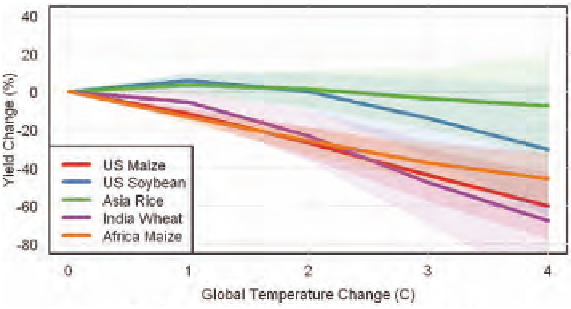Environmental Engineering Reference
In-Depth Information
IMPACTS ON NATURE AND SOCIETY
Food
Warming decreases yields of several crops in major growing regions,
with ~5-10% yield loss per °C of local warming, or about 7-15% per °C
of global warming (see Figure O.5).
Crops tend to develop more quickly
under warmer temperatures, leading to shorter growing periods and lower
yields, and higher temperatures drive faster evaporation of water from soils.
Increases in CO
2
levels can be beneficial for some crop and forage yields,
for example by stimulating photosynthetic rates, but effects are much smaller
for crops with a C4 photosynthetic pathway such as maize (corn). These
direct effects of increased CO
2
compete with yield reductions linked to
warming. {5.1}
Global climate change is expected to reduce yields of key food crops
in some tropical regions by about 7-15% over about the next 20 years.
This can be expected to make it more difficult to keep up with increasing
food demand even if continuing advances in technologies and agricultural
practices are as effective as in the past.
As a point of comparison, the global
Local Warming (C˚) for:
Low Latitudes
Mid-High Latitudes
0
1.2
2.4
3.6
4.8
0
1.5
3.0
4.5
6.0
FIGURE O.5 Projected changes in yields of several crops worldwide as a function of global warming (rela-
tive to pre-industrial temperatures) in the absence of adaptation. Best estimates and likely uncertainty
ranges are shown. {5.1}


